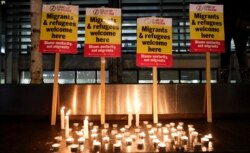LONDON — British and Belgian police are continuing their investigations into the people-smuggling networks that transported 39 migrants who were found dead in the back of a refrigerated truck near London on October 23.
Suffocation is the suspected cause of the migrants’ deaths in the sealed container. Many of the victims are believed to be Vietnamese and appeared to have traveled across the border to China and into Russia and Europe, before crossing the English Channel from the Belgian port of Zeebrugge to Purfleet on the River Thames.
The truck was reportedly registered in Bulgaria. The driver, 25-year-old Maurice Robinson from Northern Ireland, has been charged with manslaughter, people trafficking and money laundering.
Police are seeking two brothers in the deaths — 40-year-old Ronan Hughes and 34-year-old Christopher Hughes, also from Northern Ireland.
The migrants’ journey reportedly began 9,000 kilometers away in the remote Nghe An and Hanoi provinces in northern Vietnam.
On the doorstep of a family home in the village of Ha Tinh, Bui Phan Chinh comforted his grandson as they waited for further news. Chinh believes his son, — the boy’s father, Bui Phan Thang — was among the victims.
“Many people in this village have gone abroad to work, so my son wanted to go abroad like others to earn money,” Chinh explained. “No one could imagine that he ended his life there forever, leaving behind his wife and the young kids.”
Demand for travel
The growing demand to travel to Britain and other wealthy Western countries is well-suited for people-trafficking gangs, says Phil Robertson of Human Rights Watch.
“These are groups, gangs, that operate with impunity in Vietnam. In many cases, they have connections to official authorities, so there’s that corruption element going on that allows them to offer to get people to places in Europe,” he said.
Family members say they paid these gangs up to $38,000 to reach Europe. Criminologist Paolo Campana, an expert on people-smuggling networks at the University of Cambridge, says different gangs compete with each other.
“What we see is a fragmentation and a compartmentalization of the smuggling. So in a sense, you don’t have a ‘Mister Big’ controlling everything, but you have fairly small rudimentary organizations that might take care of each stage in the journey,” Campana said.
“In some cases,” he told VOA, “smugglers advertise services such as a VIP service, and they charge more. In other cases, you just have a very basic service in the sense that you have to cover your own accommodation while you are en route. And the smuggling group might only try to find you a way to get across the English Channel.”
Each leg of the journey isolated
The human cargo is transferred at handover points en route, he explained.
“Migrants have to make incredibly difficult decisions of whether to trust Smuggler A or Smuggler B. Word-of-mouth plays a very large role. In other cases, for instance, with the Syrians or the Iraqi (migrants), you also have Facebook groups, or forums on the internet, where smugglers advertise their services, and migrants can question, can try to get more information, about the service provided by these smugglers,” he said. “I would be very surprised if the people who were involved in the last leg of the journey, whoever they be, would have any knowledge about what has happened in China or in Russia or in Eastern Europe.”
“We have people coming into the country, either being trafficked or as asylum-seekers. And we know that the borders are very tight and complicated, and there are more and more chances being taken,” Martin Pasmore, detective chief inspector, told reporters this week.
Robertson warned that it’s not only Europe’s responsibility to seek justice.
“There has to be some real pressure on Vietnam also to end these kind of people-smuggling arrangements,” he said.
Experts say clamping down on people-trafficking gangs requires better cross-border cooperation. They warn that as long as there’s demand, the gangs will continue to prosper.






